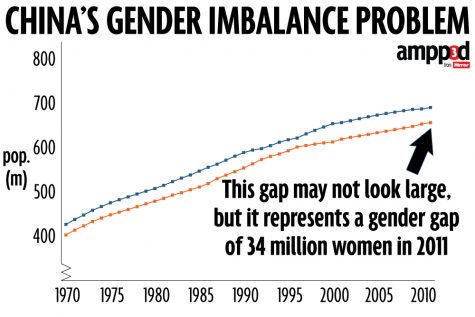China reverses one child only policy; incentivizes second child
March 7, 2017
For nearly four decades, China implemented a One Child Policy that only allowed Chinese families to have one child. This policy, which ended in 2015, was pushed harshly and strictly by the Chinese Government but did result in slowing China’s overpopulation problem. Now, however, the government is looking to encourage citizens to have a second child after the One Child Only Policy .
This policy had a bigger effect than simply helping solve China’s overpopulation issue. It created a huge gender gap and lack of females due to East Asia’s societal preference of males over females according to Demographers. Besides a gender gap and lack of females in China, according to Dr. Jackson, an author of a 2008 report on aging in China, said that “the policy brought the unexpected consequence of a dire shortage of younger relatives to care for a rapidly aging population.”
Though many Chinese citizens celebrated the idea of the policy, due to the fact that the policy was implemented for such a sufficient amount of time, Chinese citizens have considered having one child another social norm, according to an article from NY Times, experts say China’s citizens will feel the impact of the policy for decades to come.

This graph indicates the gender-based consequences of China’s One Child Only Policy. The current ration of women to men is about 1:9.
To offset these effects, in 2016, China’s Second Child Policy was implemented, hoping to bring back up the fertility rates in China. According to government figures, the number of babies born in 2016 jumped 7.9% from the previous year. The policy has seemed to be working without governmental subsidies.
Though reports from the Population Reference Bureau show that the fertility rates are rising again, the rates are not fully up to scale to reach China’s targeted birth rates. The problem that reports and surveys have collected is that families do not feel they have the financial income to support a second child. In order to reach the Chinese desired birth rate targets According to CNN news, Wang Peian, the vice-minister of the National Health and Family Planning Commission, said the commission is considering “birth rewards and subsidies” for second children, the state-owned China Daily reported on Tuesday, February 28th. Lu Jiehua, a sociology professor at Peking University, said that financial incentives for a second child are a “positive signal.”
On the contrary to this policy, Hazel Denton, a former World Bank economist predicts that the increase of women’s education would have a greater effect than the policy , he states, “where women have a choice, and they have the opportunity to be educated and employed, they will choose a smaller family.”
In China, the cost of living and education had begun to increase decade by decade, with this, the government will need to look further into the cost of the subsidies in order to determine whether or not this bonus system will work. Details on what the bonus system will include is unknown, but it is more than likely needed to consider what the average cost is to raise a child in China in order to determine the subsidies they would give to families. Regardless of whether or not this bonus system will happen, it is a big step in a different direction from China’s previous policies regarding families.








